Game Developer Resume Examples

Aug 27, 2024
|
12 min read
Level up your career: Tips to craft a game developer resume that stands out.
Rated by 348 people
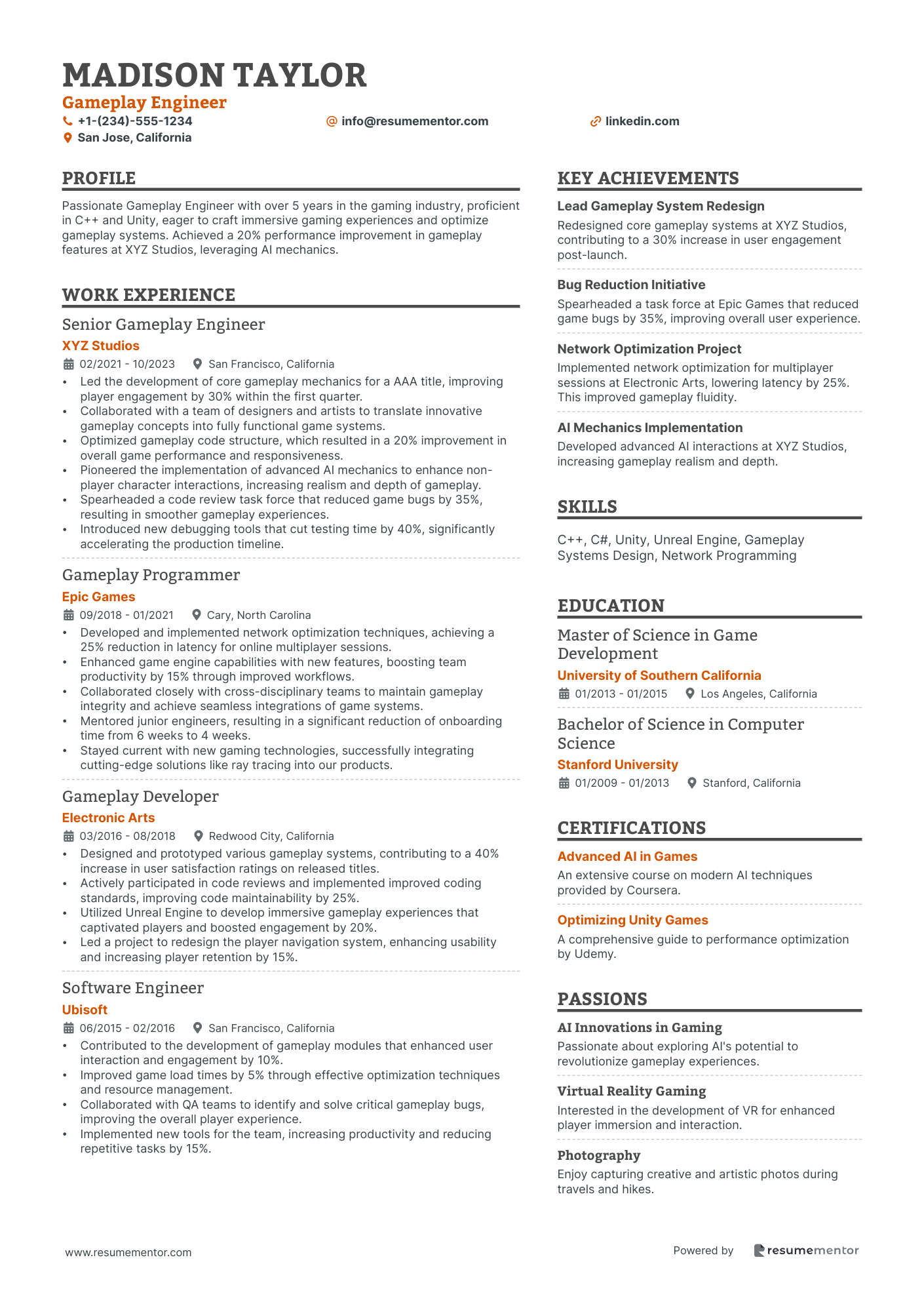
Gameplay Engineer
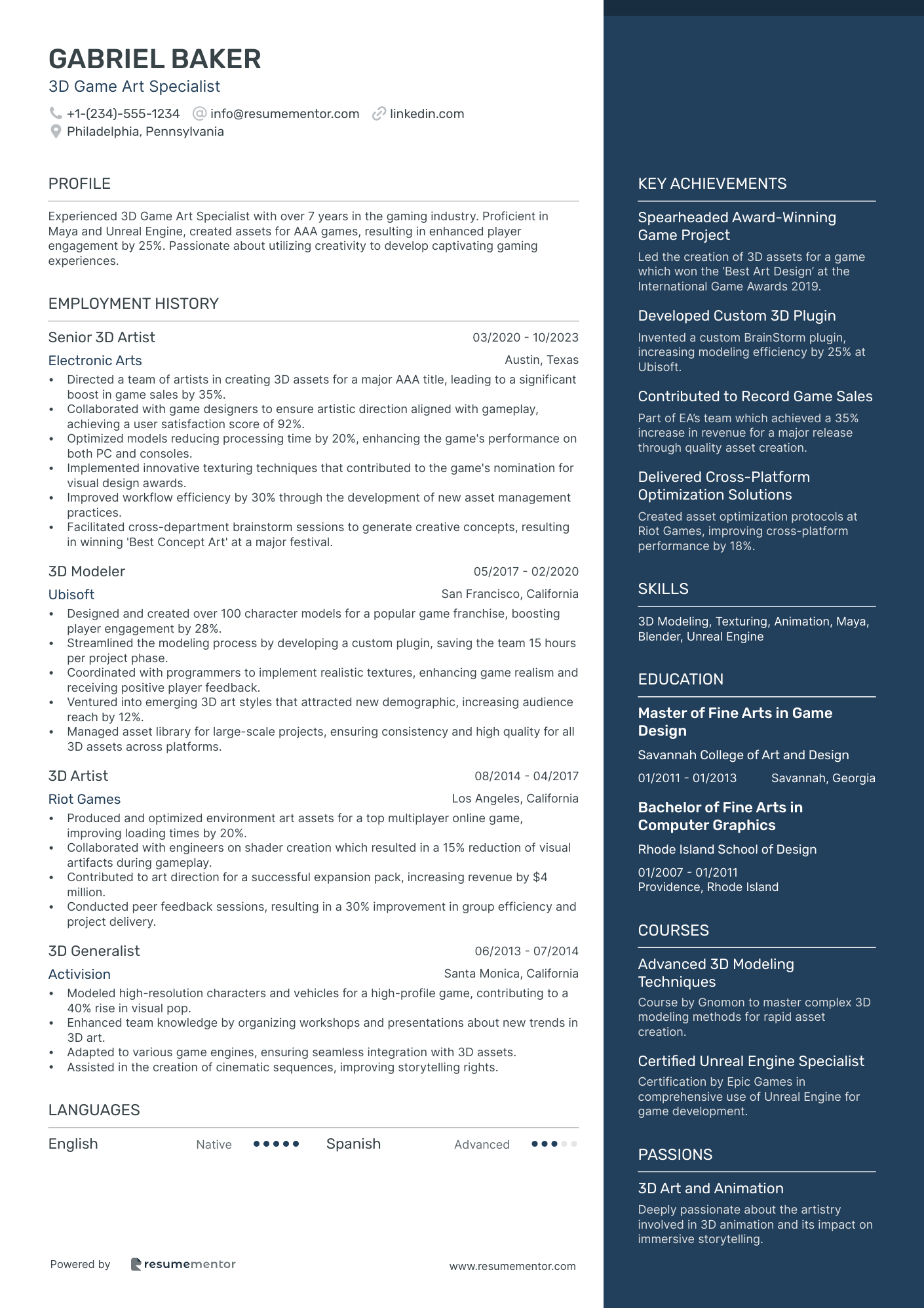
3D Game Art Specialist
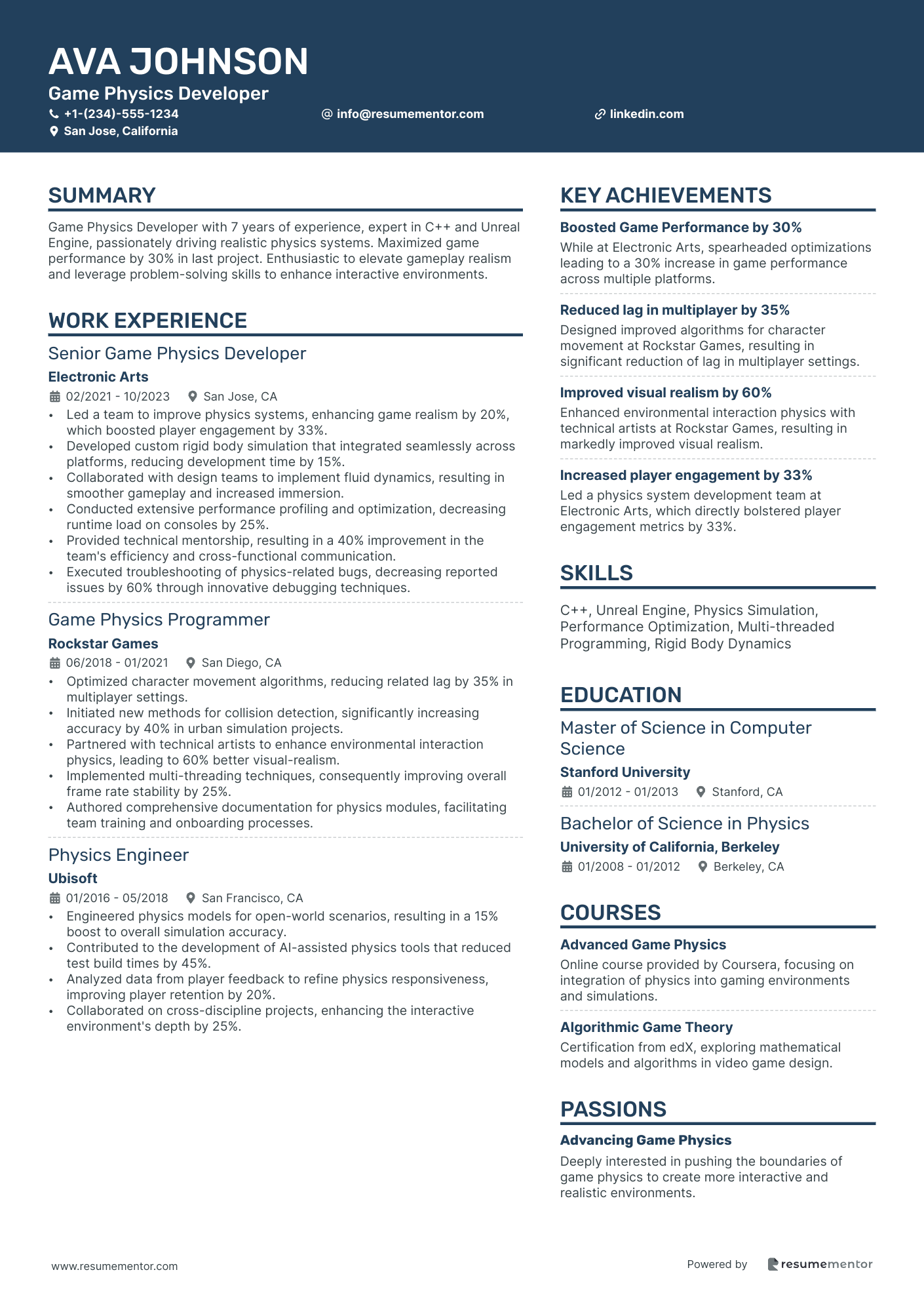
Game Physics Developer
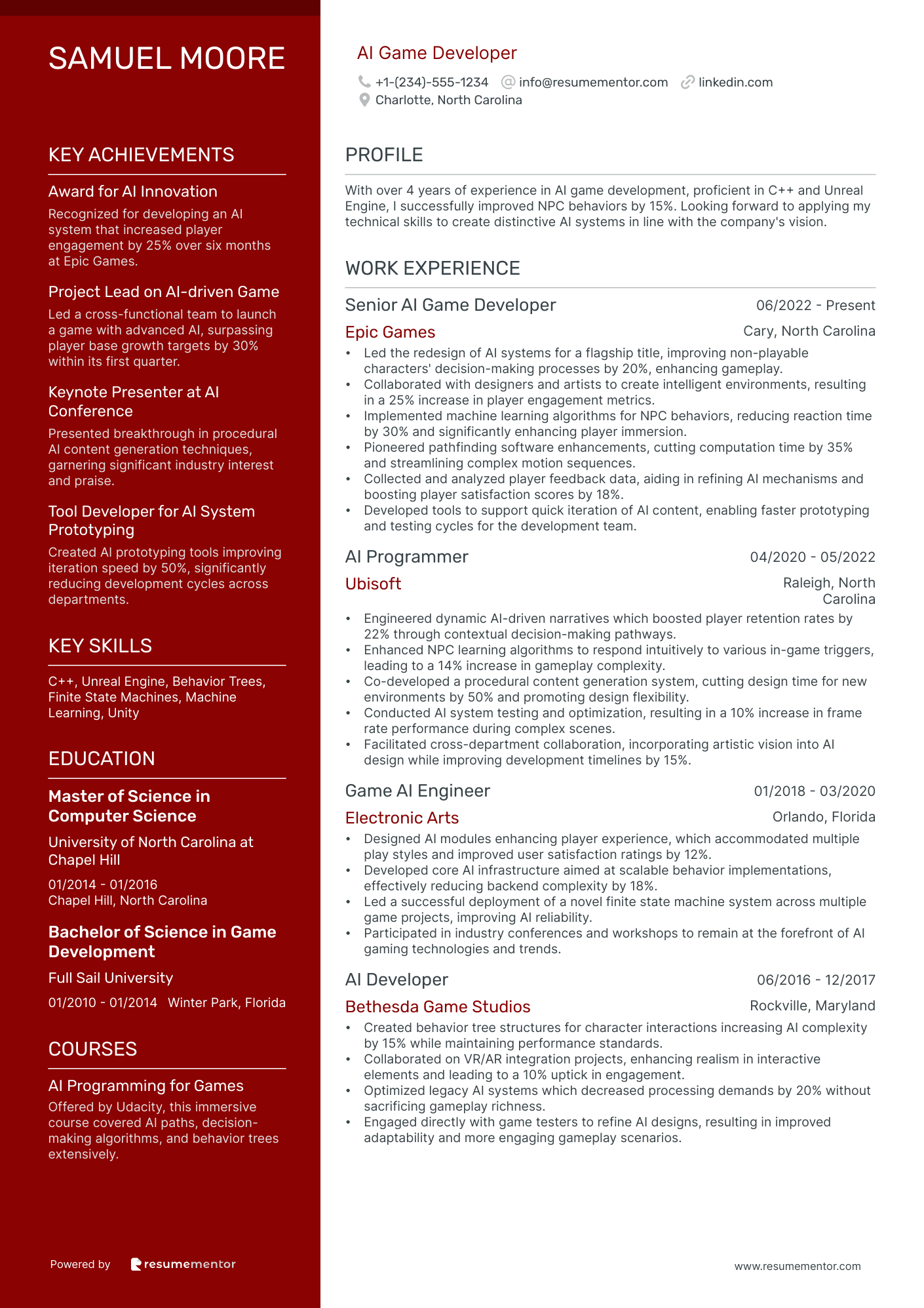
AI Game Developer
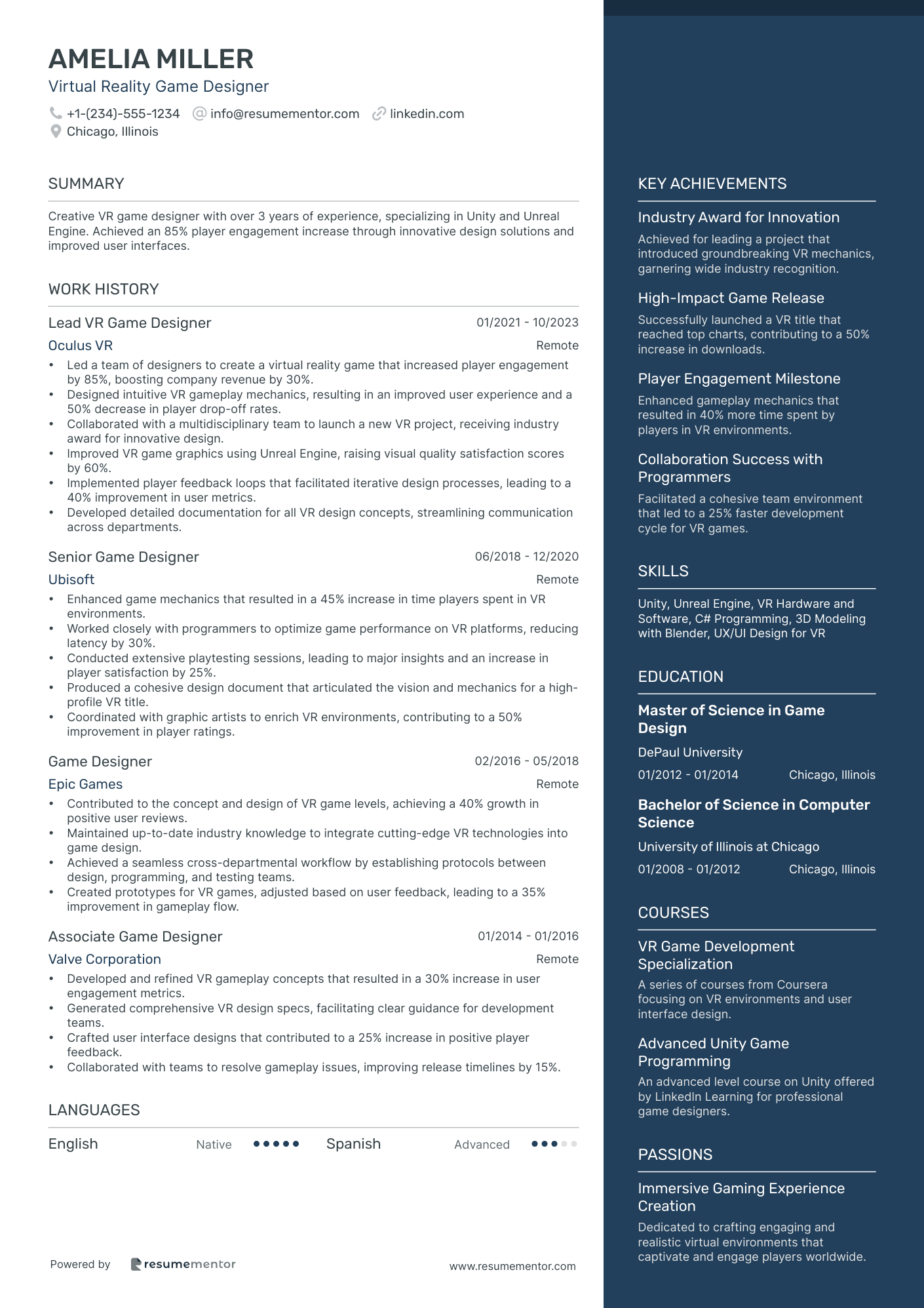
Virtual Reality Game Designer
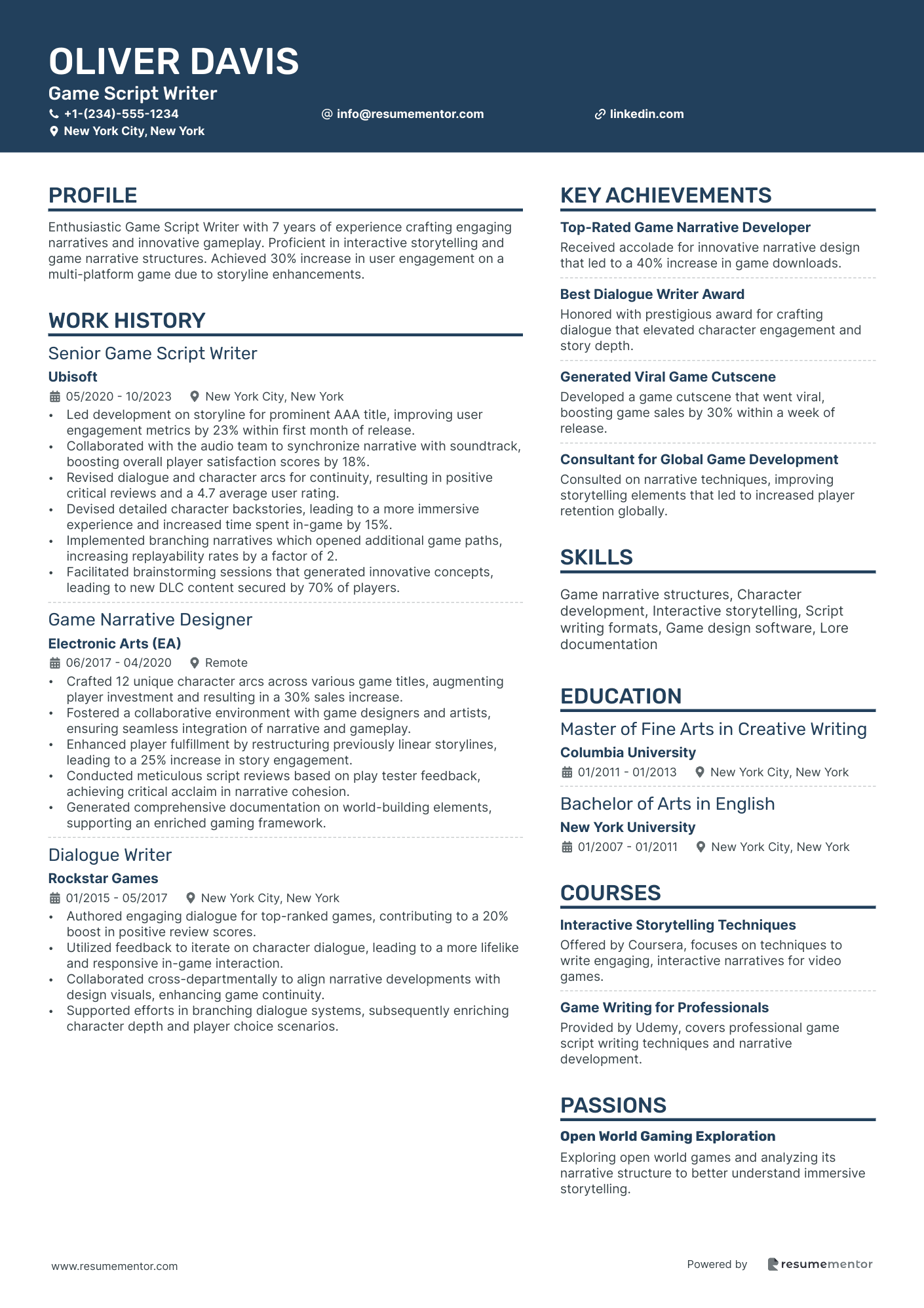
Game Script Writer
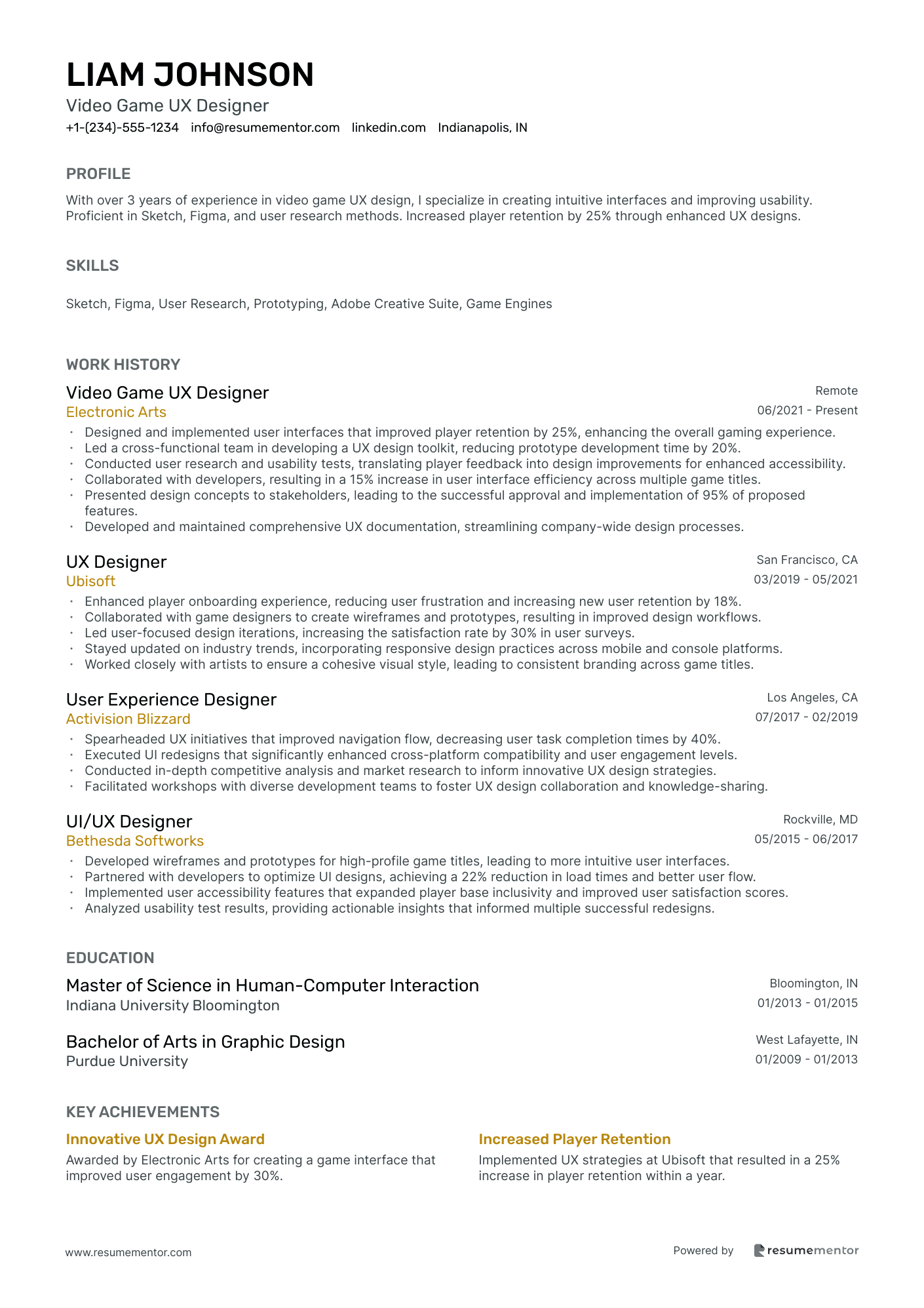
Video Game UX Designer
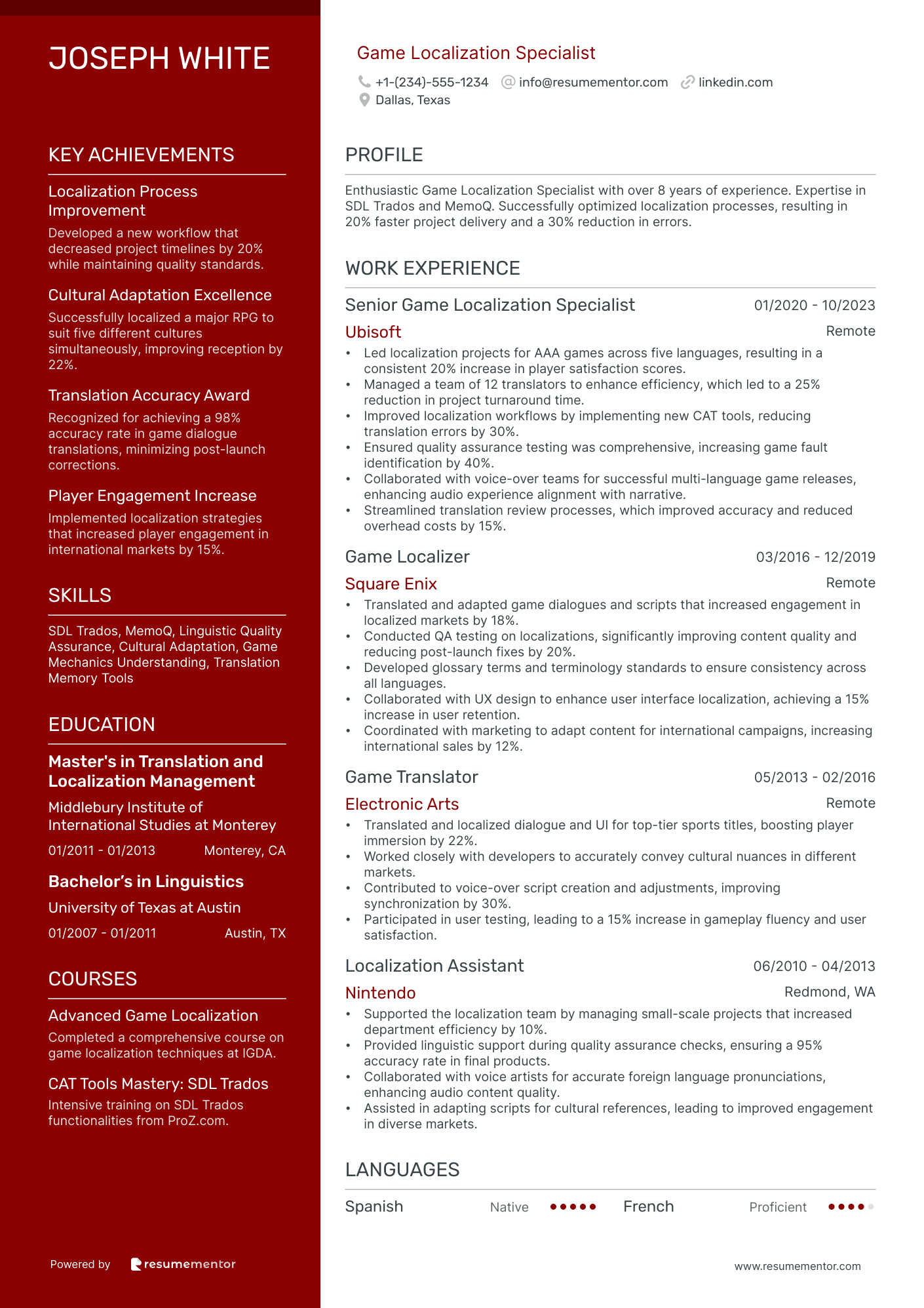
Game Localization Specialist
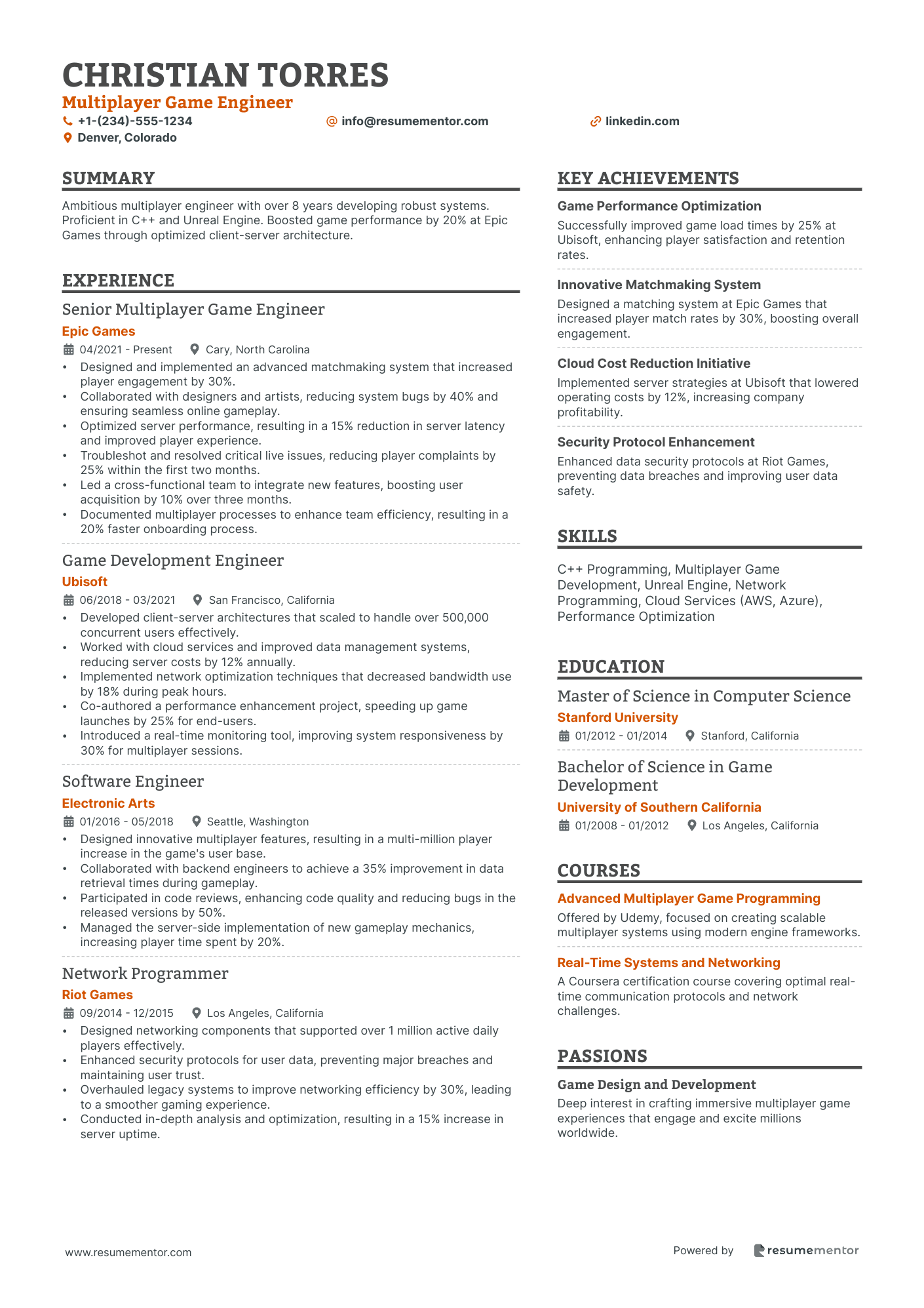
Multiplayer Game Engineer

Gameplay Engineer resume sample
- •Led the development of core gameplay mechanics for a AAA title, improving player engagement by 30% within the first quarter.
- •Collaborated with a team of designers and artists to translate innovative gameplay concepts into fully functional game systems.
- •Optimized gameplay code structure, which resulted in a 20% improvement in overall game performance and responsiveness.
- •Pioneered the implementation of advanced AI mechanics to enhance non-player character interactions, increasing realism and depth of gameplay.
- •Spearheaded a code review task force that reduced game bugs by 35%, resulting in smoother gameplay experiences.
- •Introduced new debugging tools that cut testing time by 40%, significantly accelerating the production timeline.
- •Developed and implemented network optimization techniques, achieving a 25% reduction in latency for online multiplayer sessions.
- •Enhanced game engine capabilities with new features, boosting team productivity by 15% through improved workflows.
- •Collaborated closely with cross-disciplinary teams to maintain gameplay integrity and achieve seamless integrations of game systems.
- •Mentored junior engineers, resulting in a significant reduction of onboarding time from 6 weeks to 4 weeks.
- •Stayed current with new gaming technologies, successfully integrating cutting-edge solutions like ray tracing into our products.
- •Designed and prototyped various gameplay systems, contributing to a 40% increase in user satisfaction ratings on released titles.
- •Actively participated in code reviews and implemented improved coding standards, improving code maintainability by 25%.
- •Utilized Unreal Engine to develop immersive gameplay experiences that captivated players and boosted engagement by 20%.
- •Led a project to redesign the player navigation system, enhancing usability and increasing player retention by 15%.
- •Contributed to the development of gameplay modules that enhanced user interaction and engagement by 10%.
- •Improved game load times by 5% through effective optimization techniques and resource management.
- •Collaborated with QA teams to identify and solve critical gameplay bugs, improving the overall player experience.
- •Implemented new tools for the team, increasing productivity and reducing repetitive tasks by 15%.
3D Game Art Specialist resume sample
- •Directed a team of artists in creating 3D assets for a major AAA title, leading to a significant boost in game sales by 35%.
- •Collaborated with game designers to ensure artistic direction aligned with gameplay, achieving a user satisfaction score of 92%.
- •Optimized models reducing processing time by 20%, enhancing the game's performance on both PC and consoles.
- •Implemented innovative texturing techniques that contributed to the game's nomination for visual design awards.
- •Improved workflow efficiency by 30% through the development of new asset management practices.
- •Facilitated cross-department brainstorm sessions to generate creative concepts, resulting in winning 'Best Concept Art' at a major festival.
- •Designed and created over 100 character models for a popular game franchise, boosting player engagement by 28%.
- •Streamlined the modeling process by developing a custom plugin, saving the team 15 hours per project phase.
- •Coordinated with programmers to implement realistic textures, enhancing game realism and receiving positive player feedback.
- •Ventured into emerging 3D art styles that attracted new demographic, increasing audience reach by 12%.
- •Managed asset library for large-scale projects, ensuring consistency and high quality for all 3D assets across platforms.
- •Produced and optimized environment art assets for a top multiplayer online game, improving loading times by 20%.
- •Collaborated with engineers on shader creation which resulted in a 15% reduction of visual artifacts during gameplay.
- •Contributed to art direction for a successful expansion pack, increasing revenue by $4 million.
- •Conducted peer feedback sessions, resulting in a 30% improvement in group efficiency and project delivery.
- •Modeled high-resolution characters and vehicles for a high-profile game, contributing to a 40% rise in visual pop.
- •Enhanced team knowledge by organizing workshops and presentations about new trends in 3D art.
- •Adapted to various game engines, ensuring seamless integration with 3D assets.
- •Assisted in the creation of cinematic sequences, improving storytelling rights.
Game Physics Developer resume sample
- •Led a team to improve physics systems, enhancing game realism by 20%, which boosted player engagement by 33%.
- •Developed custom rigid body simulation that integrated seamlessly across platforms, reducing development time by 15%.
- •Collaborated with design teams to implement fluid dynamics, resulting in smoother gameplay and increased immersion.
- •Conducted extensive performance profiling and optimization, decreasing runtime load on consoles by 25%.
- •Provided technical mentorship, resulting in a 40% improvement in the team's efficiency and cross-functional communication.
- •Executed troubleshooting of physics-related bugs, decreasing reported issues by 60% through innovative debugging techniques.
- •Optimized character movement algorithms, reducing related lag by 35% in multiplayer settings.
- •Initiated new methods for collision detection, significantly increasing accuracy by 40% in urban simulation projects.
- •Partnered with technical artists to enhance environmental interaction physics, leading to 60% better visual-realism.
- •Implemented multi-threading techniques, consequently improving overall frame rate stability by 25%.
- •Authored comprehensive documentation for physics modules, facilitating team training and onboarding processes.
- •Engineered physics models for open-world scenarios, resulting in a 15% boost to overall simulation accuracy.
- •Contributed to the development of AI-assisted physics tools that reduced test build times by 45%.
- •Analyzed data from player feedback to refine physics responsiveness, improving player retention by 20%.
- •Collaborated on cross-discipline projects, enhancing the interactive environment's depth by 25%.
- •Implemented basic physics algorithms in early projects, establishing groundwork for future developments with a 50% success rate.
- •Conducted research on innovative physics programming techniques, enabling a 30% reduction in processing loads.
- •Assisted in debugging physics systems, learning advanced trouble-solving methods and decreasing downtimes.
- •Gained proficiency in Unreal Engine, contributing to improved game physics execution quality.
AI Game Developer resume sample
- •Led the redesign of AI systems for a flagship title, improving non-playable characters' decision-making processes by 20%, enhancing gameplay.
- •Collaborated with designers and artists to create intelligent environments, resulting in a 25% increase in player engagement metrics.
- •Implemented machine learning algorithms for NPC behaviors, reducing reaction time by 30% and significantly enhancing player immersion.
- •Pioneered pathfinding software enhancements, cutting computation time by 35% and streamlining complex motion sequences.
- •Collected and analyzed player feedback data, aiding in refining AI mechanisms and boosting player satisfaction scores by 18%.
- •Developed tools to support quick iteration of AI content, enabling faster prototyping and testing cycles for the development team.
- •Engineered dynamic AI-driven narratives which boosted player retention rates by 22% through contextual decision-making pathways.
- •Enhanced NPC learning algorithms to respond intuitively to various in-game triggers, leading to a 14% increase in gameplay complexity.
- •Co-developed a procedural content generation system, cutting design time for new environments by 50% and promoting design flexibility.
- •Conducted AI system testing and optimization, resulting in a 10% increase in frame rate performance during complex scenes.
- •Facilitated cross-department collaboration, incorporating artistic vision into AI design while improving development timelines by 15%.
- •Designed AI modules enhancing player experience, which accommodated multiple play styles and improved user satisfaction ratings by 12%.
- •Developed core AI infrastructure aimed at scalable behavior implementations, effectively reducing backend complexity by 18%.
- •Led a successful deployment of a novel finite state machine system across multiple game projects, improving AI reliability.
- •Participated in industry conferences and workshops to remain at the forefront of AI gaming technologies and trends.
- •Created behavior tree structures for character interactions increasing AI complexity by 15% while maintaining performance standards.
- •Collaborated on VR/AR integration projects, enhancing realism in interactive elements and leading to a 10% uptick in engagement.
- •Optimized legacy AI systems which decreased processing demands by 20% without sacrificing gameplay richness.
- •Engaged directly with game testers to refine AI designs, resulting in improved adaptability and more engaging gameplay scenarios.
Virtual Reality Game Designer resume sample
- •Led a team of designers to create a virtual reality game that increased player engagement by 85%, boosting company revenue by 30%.
- •Designed intuitive VR gameplay mechanics, resulting in an improved user experience and a 50% decrease in player drop-off rates.
- •Collaborated with a multidisciplinary team to launch a new VR project, receiving industry award for innovative design.
- •Improved VR game graphics using Unreal Engine, raising visual quality satisfaction scores by 60%.
- •Implemented player feedback loops that facilitated iterative design processes, leading to a 40% improvement in user metrics.
- •Developed detailed documentation for all VR design concepts, streamlining communication across departments.
- •Enhanced game mechanics that resulted in a 45% increase in time players spent in VR environments.
- •Worked closely with programmers to optimize game performance on VR platforms, reducing latency by 30%.
- •Conducted extensive playtesting sessions, leading to major insights and an increase in player satisfaction by 25%.
- •Produced a cohesive design document that articulated the vision and mechanics for a high-profile VR title.
- •Coordinated with graphic artists to enrich VR environments, contributing to a 50% improvement in player ratings.
- •Contributed to the concept and design of VR game levels, achieving a 40% growth in positive user reviews.
- •Maintained up-to-date industry knowledge to integrate cutting-edge VR technologies into game design.
- •Achieved a seamless cross-departmental workflow by establishing protocols between design, programming, and testing teams.
- •Created prototypes for VR games, adjusted based on user feedback, leading to a 35% improvement in gameplay flow.
- •Developed and refined VR gameplay concepts that resulted in a 30% increase in user engagement metrics.
- •Generated comprehensive VR design specs, facilitating clear guidance for development teams.
- •Crafted user interface designs that contributed to a 25% increase in positive player feedback.
- •Collaborated with teams to resolve gameplay issues, improving release timelines by 15%.
Game Script Writer resume sample
- •Led development on storyline for prominent AAA title, improving user engagement metrics by 23% within first month of release.
- •Collaborated with the audio team to synchronize narrative with soundtrack, boosting overall player satisfaction scores by 18%.
- •Revised dialogue and character arcs for continuity, resulting in positive critical reviews and a 4.7 average user rating.
- •Devised detailed character backstories, leading to a more immersive experience and increased time spent in-game by 15%.
- •Implemented branching narratives which opened additional game paths, increasing replayability rates by a factor of 2.
- •Facilitated brainstorming sessions that generated innovative concepts, leading to new DLC content secured by 70% of players.
- •Crafted 12 unique character arcs across various game titles, augmenting player investment and resulting in a 30% sales increase.
- •Fostered a collaborative environment with game designers and artists, ensuring seamless integration of narrative and gameplay.
- •Enhanced player fulfillment by restructuring previously linear storylines, leading to a 25% increase in story engagement.
- •Conducted meticulous script reviews based on play tester feedback, achieving critical acclaim in narrative cohesion.
- •Generated comprehensive documentation on world-building elements, supporting an enriched gaming framework.
- •Authored engaging dialogue for top-ranked games, contributing to a 20% boost in positive review scores.
- •Utilized feedback to iterate on character dialogue, leading to a more lifelike and responsive in-game interaction.
- •Collaborated cross-departmentally to align narrative developments with design visuals, enhancing game continuity.
- •Supported efforts in branching dialogue systems, subsequently enriching character depth and player choice scenarios.
- •Constructed narrative frameworks for episodic releases, improving user retention by 35% over series duration.
- •Participated in brainstorming sessions for narrative extensions, translating ideas into dynamic content.
- •Worked closely with artists to blend visual storytelling with verbal elements, elevating the overall gameplay experience.
- •Documented lore and character backstories, facilitating more cohesive storyline integration across multiple projects.
Video Game UX Designer resume sample
- •Designed and implemented user interfaces that improved player retention by 25%, enhancing the overall gaming experience.
- •Led a cross-functional team in developing a UX design toolkit, reducing prototype development time by 20%.
- •Conducted user research and usability tests, translating player feedback into design improvements for enhanced accessibility.
- •Collaborated with developers, resulting in a 15% increase in user interface efficiency across multiple game titles.
- •Presented design concepts to stakeholders, leading to the successful approval and implementation of 95% of proposed features.
- •Developed and maintained comprehensive UX documentation, streamlining company-wide design processes.
- •Enhanced player onboarding experience, reducing user frustration and increasing new user retention by 18%.
- •Collaborated with game designers to create wireframes and prototypes, resulting in improved design workflows.
- •Led user-focused design iterations, increasing the satisfaction rate by 30% in user surveys.
- •Stayed updated on industry trends, incorporating responsive design practices across mobile and console platforms.
- •Worked closely with artists to ensure a cohesive visual style, leading to consistent branding across game titles.
- •Spearheaded UX initiatives that improved navigation flow, decreasing user task completion times by 40%.
- •Executed UI redesigns that significantly enhanced cross-platform compatibility and user engagement levels.
- •Conducted in-depth competitive analysis and market research to inform innovative UX design strategies.
- •Facilitated workshops with diverse development teams to foster UX design collaboration and knowledge-sharing.
- •Developed wireframes and prototypes for high-profile game titles, leading to more intuitive user interfaces.
- •Partnered with developers to optimize UI designs, achieving a 22% reduction in load times and better user flow.
- •Implemented user accessibility features that expanded player base inclusivity and improved user satisfaction scores.
- •Analyzed usability test results, providing actionable insights that informed multiple successful redesigns.
Game Localization Specialist resume sample
- •Led localization projects for AAA games across five languages, resulting in a consistent 20% increase in player satisfaction scores.
- •Managed a team of 12 translators to enhance efficiency, which led to a 25% reduction in project turnaround time.
- •Improved localization workflows by implementing new CAT tools, reducing translation errors by 30%.
- •Ensured quality assurance testing was comprehensive, increasing game fault identification by 40%.
- •Collaborated with voice-over teams for successful multi-language game releases, enhancing audio experience alignment with narrative.
- •Streamlined translation review processes, which improved accuracy and reduced overhead costs by 15%.
- •Translated and adapted game dialogues and scripts that increased engagement in localized markets by 18%.
- •Conducted QA testing on localizations, significantly improving content quality and reducing post-launch fixes by 20%.
- •Developed glossary terms and terminology standards to ensure consistency across all languages.
- •Collaborated with UX design to enhance user interface localization, achieving a 15% increase in user retention.
- •Coordinated with marketing to adapt content for international campaigns, increasing international sales by 12%.
- •Translated and localized dialogue and UI for top-tier sports titles, boosting player immersion by 22%.
- •Worked closely with developers to accurately convey cultural nuances in different markets.
- •Contributed to voice-over script creation and adjustments, improving synchronization by 30%.
- •Participated in user testing, leading to a 15% increase in gameplay fluency and user satisfaction.
- •Supported the localization team by managing small-scale projects that increased department efficiency by 10%.
- •Provided linguistic support during quality assurance checks, ensuring a 95% accuracy rate in final products.
- •Collaborated with voice artists for accurate foreign language pronunciations, enhancing audio content quality.
- •Assisted in adapting scripts for cultural references, leading to improved engagement in diverse markets.
Multiplayer Game Engineer resume sample
- •Designed and implemented an advanced matchmaking system that increased player engagement by 30%.
- •Collaborated with designers and artists, reducing system bugs by 40% and ensuring seamless online gameplay.
- •Optimized server performance, resulting in a 15% reduction in server latency and improved player experience.
- •Troubleshot and resolved critical live issues, reducing player complaints by 25% within the first two months.
- •Led a cross-functional team to integrate new features, boosting user acquisition by 10% over three months.
- •Documented multiplayer processes to enhance team efficiency, resulting in a 20% faster onboarding process.
- •Developed client-server architectures that scaled to handle over 500,000 concurrent users effectively.
- •Worked with cloud services and improved data management systems, reducing server costs by 12% annually.
- •Implemented network optimization techniques that decreased bandwidth use by 18% during peak hours.
- •Co-authored a performance enhancement project, speeding up game launches by 25% for end-users.
- •Introduced a real-time monitoring tool, improving system responsiveness by 30% for multiplayer sessions.
- •Designed innovative multiplayer features, resulting in a multi-million player increase in the game's user base.
- •Collaborated with backend engineers to achieve a 35% improvement in data retrieval times during gameplay.
- •Participated in code reviews, enhancing code quality and reducing bugs in the released versions by 50%.
- •Managed the server-side implementation of new gameplay mechanics, increasing player time spent by 20%.
- •Designed networking components that supported over 1 million active daily players effectively.
- •Enhanced security protocols for user data, preventing major breaches and maintaining user trust.
- •Overhauled legacy systems to improve networking efficiency by 30%, leading to a smoother gaming experience.
- •Conducted in-depth analysis and optimization, resulting in a 15% increase in server uptime.
Navigating the job market as a game developer can feel like starting a new level full of hidden challenges. Crafting a strong resume is your best tool for leveling up your career and landing the job you want. Yet, converting your digital creations and technical abilities into a few pages can be tough. This often means finding the perfect balance between creativity and the conventions employers expect. Doing so allows you to effectively highlight your programming expertise and design skills while keeping your unique experience engaging for hiring managers.
To make this process smoother, using a resume template can be a game-changer. A well-structured template provides a solid foundation on which to build your resume, making it easier to organize your skills, projects, and achievements. This way, you ensure nothing important is left out, while maintaining a professional layout. You can start with this collection of resume templates, which saves you time and lets you focus on telling your creative story.
As you progress through this guide, you'll learn how to articulate your contributions clearly and effectively. You'll also discover how to weave in industry-relevant keywords and tailor your resume for different roles. Throughout, you’ll express your passion for gaming in a professional manner. Ready to elevate your resume from a demo version to a full-fledged release? Let’s dive into the game development world and ensure your resume truly shines.
Key Takeaways
- Crafting a well-structured resume with a balance of creativity and industry conventions is crucial for game developers to showcase their technical skills and creative projects effectively.
- Utilizing a resume template can simplify the process of organizing professional achievements, ensuring a professional layout and that no important details are left out.
- Highlighting technical skills such as proficiency in game engines and programming languages, alongside showcasing teamwork experience and achievements, is essential.
- Choosing a reverse-chronological resume format is recommended to prioritize recent work, and ensuring the resume is saved as a PDF helps maintain formatting consistency.
- Incorporating industry-relevant keywords and quantifiable achievements in the experience section can enhance resume impact, demonstrating value and aligning with job requirements.
What to focus on when writing your game developer resume
A game developer resume should communicate your technical skills, creativity, and experience in the gaming industry, showcasing your ability to build engaging and high-quality games. Recruiters want to see your proficiency with game engines and programming languages, as well as your teamwork experience in development.
How to structure your game developer resume
- Contact Information: Ensure your name, phone number, email, and LinkedIn profile are clearly listed for easy access—essential details that enable recruiters to contact you without difficulty, emphasizing professionalism and readiness for opportunities.
- Summary: Provide an engaging overview of your experience, highlighting your strengths in game development and any standout skills—this acts as your personal elevator pitch, setting the tone for the rest of your resume and capturing the attention of hiring managers.
- Technical Skills: Feature your knowledge of programming languages like C++ and Python, as well as expertise with game engines like Unity or Unreal Engine—demonstrating your technical proficiency and your ability to adapt to the ever-evolving demands of the gaming industry.
- Professional Experience: Illustrate your work history within game development, detailing roles, responsibilities, and achievements that demonstrate your impact—these insights communicate your contributions to previous projects and your growth as a developer.
- Education: Present your degree, plus any relevant courses or certifications in game design or computer science to highlight your academic foundation—this supports your technical skills and shows your commitment to continuous learning in the field.
- Projects: Showcase examples of games or components you've developed, including links to your portfolio to offer a comprehensive view of your work—this section allows potential employers to see your creative abilities and technical accomplishments firsthand.
Including optional sections like Awards, Conferences, or Publications can further enrich your resume, providing additional insights into your expertise and accomplishments. Now that you have an understanding of what to include, let's discuss the resume format below, where each section will be covered more in-depth.
Which resume format to choose
As a game developer, crafting a resume that effectively highlights your skills and experience starts with choosing the right format. The reverse-chronological format is ideal because it prioritizes your latest work and projects, allowing employers to quickly see your evolution and current expertise in game development.
Once you've settled on the format, it's time to consider the font. While this might seem like a minor detail, using a modern font like Rubik, Montserrat, or Exo 2 can significantly impact how your resume is perceived. These fonts strike a balance between looking professional and being easy to read, making your achievements and skills stand out in a clean, stylish way.
Next, always save and send your resume as a PDF. This choice is crucial for preserving your formatting, ensuring that your carefully structured resume appears the same on all devices and platforms. This consistency reflects professionalism and protects the integrity of your presentation.
Finally, pay attention to the margins. Keeping them at about one inch on all sides creates a clean and organized layout. Adequate margins provide enough white space to make your resume approachable, allowing your expertly designed content to breathe while guiding the reader's eye through your experience and accomplishments.
Each of these elements works together to create a comprehensive and appealing resume that effectively showcases your talents as a game developer.
How to write a quantifiable resume experience section
Your game developer resume experience section plays a pivotal role in catching the attention of hiring managers. This section not only highlights your skills but also aligns your accomplishments with the job you're targeting. By organizing your experience in reverse chronological order, you allow employers to see your most recent and relevant achievements first. Typically, you should cover the last 10-15 years, focusing on roles that are closely related to game development. Including a variety of relevant job titles helps showcase your versatility and skillset, even if they differ from each other. Tailoring each resume to the specific job ad by using keywords from the posting ensures that you align with what the employer is seeking.
Incorporating action words like "developed," "implemented," and "engineered" adds energy to your resume and clearly communicates your contributions. Keeping the experience section concise yet specific is crucial. Emphasizing quantifiable achievements gives a clearer picture of your impact, unlike vague descriptions. By specifying how your work improved performance, increased engagement, or enhanced the user experience, you present your value effectively. Using numbers or percentages to illustrate your success makes your achievements more tangible and impressive.
Here’s a seamlessly crafted example that brings these elements together:
- •Developed a high-impact AAA game that increased user engagement by 45% in the first year.
- •Led a team in implementing a new game engine, improving processing speed by 30%.
- •Coordinated with artists and designers to decrease asset turnover time by 25%.
- •Optimized monetization strategies, resulting in a 50% increase in in-game purchase revenue.
This experience section effectively draws the reader in by clearly demonstrating your achievements and their impact. It showcases direct results through measurable outcomes and uses dynamic language to convey your contributions. Highlighting a role in AAA game development aligns seamlessly with relevant keywords and positions you as a skilled, results-driven candidate. By tailoring your resume to the job and emphasizing metrics, you ensure your significant contributions stand out clearly.
Project-Focused resume experience section
A project-focused game developer's resume experience section should clearly demonstrate your ability to lead and contribute to successful projects. Begin by highlighting specific roles and projects you've been part of, focusing on how your contributions directly led to successful outcomes. This is where your problem-solving skills and creativity shine, showing potential employers how you navigate challenges during development.
Organize your achievements using bullet points to provide clarity and impact. Mention relevant technologies and skills, along with your specific role in each project. By quantifying your accomplishments, such as time saved or increased user engagement, you showcase the tangible impact of your work. Ensure the details are aligned with the job you're applying for, illustrating how your past experiences make you an ideal candidate for the role.
Game Developer
Innovative Game Studios
June 2020 - July 2023
- Led a team of five in developing a 3D role-playing game using Unity, increasing performance by 20%.
- Implemented user feedback systems to boost satisfaction rates by 15%.
- Optimized game rendering code, reducing load times by 30%.
- Collaborated with artists and designers to create engaging game art and a seamless user experience.
Innovation-Focused resume experience section
An innovation-focused game developer resume experience section should highlight your ability to bring fresh ideas and solutions that drive project success. Emphasize the projects where your innovative approaches led to significant advancements and measurable outcomes. Share how your contributions made a difference, and use numbers to clearly demonstrate the impact of your work.
Each bullet point should begin with a compelling action verb, effectively summarizing your role in the innovation process. Tell how you integrated new technologies or methods, showing their impact on existing systems. Highlight your ability to work collaboratively while leading initiatives that push the boundaries of what's possible. Keep the language straightforward and engaging, ensuring a smooth, connected narrative throughout.
Senior Game Developer
XYZ Games
June 2020 - August 2023
- Pioneered a new AI character behavior system that made in-game interactions more lifelike, boosting player engagement by 30%.
- Created a specialized game level editor tool that seamlessly enhanced development efficiency by 40% for the design team.
- Steered a cross-functional team to develop a cutting-edge VR feature, which directly increased user retention by 25% after launch.
- Worked closely with key stakeholders to launch a novel monetization strategy, contributing to a revenue growth of $500K annually.
Problem-Solving Focused resume experience section
A problem-solving-focused game developer resume experience section should effectively showcase your ability to tackle and resolve challenges during game development. Instead of listing tasks, weave stories about how you identified specific issues and devised creative solutions. Highlight the tangible improvements your efforts brought, whether through an enhanced player experience or boosted performance.
To make your problem-solving skills stand out, use concrete examples with metrics that illustrate the impact of your solutions. This clarity helps potential employers appreciate the significance of your contributions. Describe your role within each project to show your leadership, teamwork, and technical abilities. By sharing outcomes through numbers or narratives, you create a cohesive picture of your expertise in overcoming complex challenges in game development.
Game Developer
Creative Gaming Co.
June 2020 - Present
- Led the team in identifying and fixing a memory leak, boosting game performance by 25%.
- Created a new algorithm that cut load times by 40%, enhancing user experience.
- Put in place a bug-tracking system that improved debugging efficiency by 30%.
- Worked with artists and designers to fix rendering issues, ensuring smooth visuals.
Achievement-Focused resume experience section
A game developer-focused resume experience section should clearly demonstrate your impact and highlight the value you’ve added in previous roles. Start by pinpointing specific achievements rather than listing daily duties to illustrate your contributions. Incorporate numbers to emphasize results, such as increasing efficiency, boosting user engagement, or playing a crucial role in a project’s triumph. Use compelling action verbs to convey your initiative and ownership, ensuring the language is concise and each bullet point effectively narrates the value you brought to your team.
Organize your experience by prioritizing your most noteworthy accomplishments first, creating a cohesive narrative. With each bullet, weave in details about technologies employed, successful collaborations with team members, or innovative problem-solving techniques to showcase your comprehensive skill set. This method not only underscores your technical expertise but also highlights your ability to flourish in collaborative settings, ultimately making your resume stand out in the competitive field of game development.
Software Engineer
XYZ Gaming Studio
June 2021 - August 2023
- Created a game that hit 2 million downloads within a year, elevating brand recognition and boosting user loyalty.
- Collaborated closely with designers and artists, crafting a smooth gaming experience that increased customer satisfaction ratings by 20%.
- Reduced game latency by 15% using Unity and Unreal Engine, which led to a significant enhancement in user experience.
- Spearheaded the integration of AI elements into gameplay, introducing innovative features that gained industry awards and recognition.
Write your game developer resume summary section
A game developer-focused resume summary should immediately capture your potential employer's attention and convey your professional strengths. Tailoring this section effectively can significantly increase your chances of standing out in a competitive job market. If you're a seasoned game developer, your summary should showcase your achievements and skills, demonstrating your expertise and impact in the industry. Convincing potential employers to read further into your resume is your first objective.
Consider this example:
This summary is effective because it quickly communicates your level of experience, key skills, and track record of success. Highlighting leadership and past achievements helps to underline your ability to deliver results, an essential quality in game development.
For those who are just starting out in their careers, a resume objective might be more suitable. This approach focuses on what you aim to achieve and how you can make valuable contributions. By expressing enthusiasm and potential, you can catch the eye of potential employers.
Here's an example:
[here was the JSON object 2]
This objective is compelling because it conveys your eagerness and willingness to learn, qualities that are often appealing to employers looking to nurture new talent.
Understanding the difference between a summary and a resume objective is important as it depends on your career stage. A summary encapsulates your achievements and skills, offering a snapshot of your professional journey. In contrast, an objective highlights your future goals and the contributions you aim to make. A resume profile blends these elements, reflecting both your past and future ambitions. The summary of qualifications provides a list of standout achievements as bullet points, allowing for a quick-scan of your capabilities. Knowing when to use each format ensures you present yourself in the best possible light to prospective employers.
Listing your game developer skills on your resume
A skills-focused game developer resume should effectively display your technical and interpersonal talents. Your skills section can stand alone or seamlessly integrate into areas like experience or the summary. Highlighting your strengths and soft skills reveals how you work with others and tackle challenges, which complements the technical abilities from your hard skills, such as coding and 3D modeling. These combined elements serve as powerful keywords that quickly convey your capabilities to potential employers, especially in systems using digital tools for initial reviews.
Consider this example of a standalone skills section:
This list is effective because it gathers all the necessary skills for game development in one clear section. Using industry terms ensures it passes automated filters, and eight skills provide a balanced snapshot of your qualifications.
Best hard skills to feature on your game developer resume
To craft captivating experiences, game developers need specific hard skills. These include:
Hard Skills
- C++
- C#
- Unity
- Unreal Engine
- JavaScript
- 3D Modeling
- Animation
- Shaders
- Game Design
- Physics Engines
- Problem-solving
- Artificial Intelligence
- Sound Design
- Cloud Computing
- Performance Optimization
Best soft skills to feature on your game developer resume
Equally important are the soft skills that highlight how you collaborate and manage tasks. These soft skills include:
These diverse skills underline your ability to innovate, collaborate, and thrive in the dynamic world of game development.
Soft Skills
- Creativity
- Communication
- Teamwork
- Adaptability
- Attention to Detail
- Time Management
- Critical Thinking
- Leadership
- Conflict Resolution
- Stress Management
- Open-mindedness
- Initiative
- Patience
- Positive Attitude
- Flexibility
How to include your education on your resume
The education section of your game developer resume is an important component. It provides insight into your academic background and how it supports your qualifications for the job. Tailoring this section to match the job you're applying for is crucial. Include only relevant education and leave out any that doesn't pertain to the role. If your GPA is impressive, you can choose to include it, especially if you recently graduated. Adding honors such as cum laude can help you stand out, so be sure to include them if applicable. When listing your degree, write the full name of your degree along with the institution, and if space permits, include the dates attended.
Here’s a wrong example:
And here's a right example:
- •Graduated cum laude
The second example is effective because it includes a degree relevant to a game developer position. Listing a high GPA and honors like cum laude shows strong academic performance. Using simple formatting keeps the details clear and professional, highlighting key achievements.
How to include game developer certificates on your resume
Including a certificates section in your game developer resume is essential. Certificates can showcase your expertise and dedication to your craft. First, list the name of the certificate. Next, include the date you earned it. Add the issuing organization’s name. You can also integrate certificates into your header for quick visibility. For example:
This example is effective because it includes high-value certificates relevant to game development. Unity Certified Developer and Unreal Engine 4 Professional are industry-recognized credentials. They directly relate to the technical skills needed for game development. Including the issuing organizations adds credibility. Featuring recent certificates demonstrates ongoing learning and keeping up with technology trends. Adding this section shows employers you are committed and qualified for the role.
Extra sections to include in your game developer resume
In the competitive world of game development, having a standout resume is essential for catching the eyes of potential employers. While technical skills and experience are crucial, including additional sections like languages, hobbies and interests, volunteer work, and books can provide a more well-rounded picture of you as a candidate. Here's how you can use these sections to your advantage:
- Language section — Highlight any additional languages you speak to show your adaptability and global outlook.
- Hobbies and interests section — Share your creative passions outside of work to build a personal connection with potential employers.
- Volunteer work section — Show your community involvement to demonstrate your leadership skills and commitment to giving back.
- Books section — List relevant books you've read to indicate your dedication to professional growth and staying knowledgeable about industry trends.
These elements provide unique insights into your personality and can separate you from the competition. Adding personal touches to your resume helps create a memorable impression. Together, these sections can show that you're not just a qualified game developer but also a dynamic and engaged individual.
In Conclusion
In conclusion, crafting a game developer resume that captures your unique blend of skills and experience is crucial for standing out in a competitive field. Tailoring your resume to highlight not only your technical skills but also your creativity and problem-solving abilities will provide a more comprehensive picture of your potential as a candidate. Using reverse-chronological format ensures your most recent and relevant experiences catch the employer's attention right away. Choose a modern font for readability and save your resume as a PDF to maintain its format across different platforms.
Don't forget to quantify your achievements in the experience section to offer tangible proof of your contributions and successes. Highlight your projects, especially those that involved teamwork, to demonstrate your ability to collaborate effectively. Including both hard and soft skills will show employers that you have a strong technical foundation combined with interpersonal abilities, aligning with what game studios typically seek.
Supplementing your resume with sections on education, certifications, and extra areas such as languages or volunteer work can also set you apart. These elements paint a fuller picture of your versatility and dedication, qualities that are valued in the dynamic world of game development. Now equipped with these insights, you're ready to transform your resume into a compelling showcase of your talents, paving the way for exciting opportunities in game development.
Related Articles

Continue Reading
Check more recommended readings to get the job of your dreams.
Resume
Resources
Tools
© 2026. All rights reserved.
Made with love by people who care.

